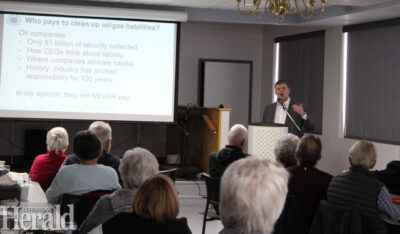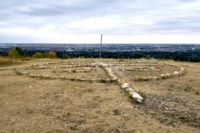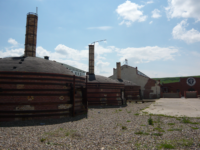Taxpayers to pay the price for unethical oil, SACPA told
By Theodora MacLeod - Lethbridge Herald Local Journalism Initiative Reporter on October 28, 2023.
 Herald photo by Theodora MacLeod
Markham Hislop of Energi Media discusses Alberta's uncertain future he says is due to unethical oil practices, on Thursday at the noon hour SACPA meeting.
Herald photo by Theodora MacLeod
Markham Hislop of Energi Media discusses Alberta's uncertain future he says is due to unethical oil practices, on Thursday at the noon hour SACPA meeting.Alberta has an ethical dilemma and taxpayers are going to pay the price.
That was the message of Thursday’s Southern Alberta Council on Public Affairs (SACPA) presentation by Markham Hislop, journalist and CEO of Energi Media. Unfortunately, according to Hislop, the price tag will be about $300 billion because of what he calls unethical oil.
“The Government and the industry have been lying to you for decades,” Hislop explained. “Not only is Alberta oil not ethical, it’s deliberately unethical.”
According to Hislop that $300-billion price tag is the result of “unfunded environmental liabilities;” the orphaned oil wells and tailings ponds that have been left by oil companies who have shown no sign of addressing their debt obligations.
But the monetary price is just one of the costs Albertans today and in the future will be saddled with if Hislop’s warnings are correct. The contamination and ecological damage from nearly a century of evaded responsibilities on the part of oil companies could mean environmental catastrophe on top of an economic crash.
“I don’t think the industry has any intention whatsoever of paying that bill,” Hislop said, adding a warning. “One of three things is going to happen: either it is going to be a financial disaster, a catastrophe for the people of Alberta….Or it’s going to be and environmental catastrophe. Or the doomsday scenario: a financial and an environmental catastrophe. That’s how bad this is.”
A mainstay of environmental law everywhere has been the agreement that the polluter pays for the restoration of the area used once the project has been completed, but in the case of Alberta’s main oil companies, in the last century, that has yet to be the case. It’s a challenge to find the exact number of abandoned (known parent, some sealed properly with the land reclaimed), versus orphaned (no known owner) scattered throughout the province, but the number is in the multiple thousands, many os which are leaking methane and other highly toxic chemicals.
In addition to the environmental impacts, the orphan wells located on privately owned land are preventing owners from legally being able to sell their land, leaving thousands of farmers across the province stuck with inactive wells producing no income, and no way of selling the land.
Though it may appear there have been attempts by the provincial government to address the issue, with programs like RStar, which offers credits to companies that clean up their wells to later be used toward future projects, Hislop said it’s not actually the case. He regards the process of rewarding oil companies for doing what is legally required of them to be morally hazardous.
“If you pay the oil companies a bunch of money, if you pay for things they should have paid for anyway, you create a precedent, why should they ever pay again?”
Part of the issue, according to Hislop, is the Alberta Energy Regulator, which he says is a captured regulator, meaning it is corrupted by the interference of oil companies and acting not in the best interest of the environment and the people of the province, but of the industry.
“Alberta is the most captured regulator, and not only that, it was designed from the beginning to be a captured regulator. This is not by accident, the regulator was set up to serve the interest of industry, not the other way around.”
He said information obtained through both freedom of information requests and internal leaks show various ways the public is being misled, including a variance in estimated liability costs, versus reported liability costs.
It is estimated that within the next ten years oil will reach its peak demand before leveling out then rapidly declining. In the wake of that decline, Alberta will not only be forced to pivot to a new revenue stream, but, according to Hislop, taxpayers will be left responsible for cleaning up the mess of oil companies who have failed to abide by the laws and regulations and the governments that has not upheld those requirements.
“There’s no reason we should be optimistic,” Hislop said, adding Alberta has another 10-20 years before catastrophe strikes.
“Albertans have no idea how much contamination is underneath the surface, near their ground water, near the aquifers, from these old leaking wells.”
17-16





Bunch of BS. AB oil and natural resources are amongst the most ethical on the planet. We aren’t killing anyone for it and we are not going to war over it. Don’t believe this liberal garbage.
in terms of four criteria (the environment, conflict, economic and social justice and freedom from oppression) the Canadian petroleum industry is “heads above other crude producers like Saudi Arabia, Libya, Nigeria and Venezuela”.[4][5] Highlighting perceived hypocrisy from Western progressive and environmental movements,[6] the author confronts what he sees as unfair criticizing them is fair game. But why has criticism of the oil sands been so disproportionately loud compared to criticism of other, larger, more disturbing sources of oil?”.[7]
Ethical oil Ezra levant (sic)